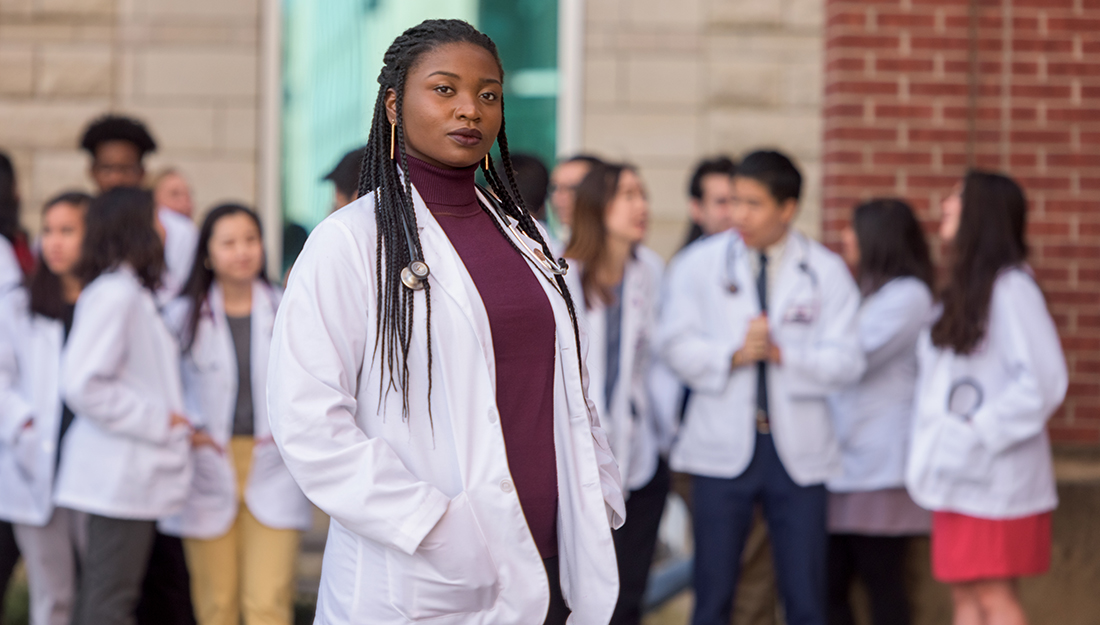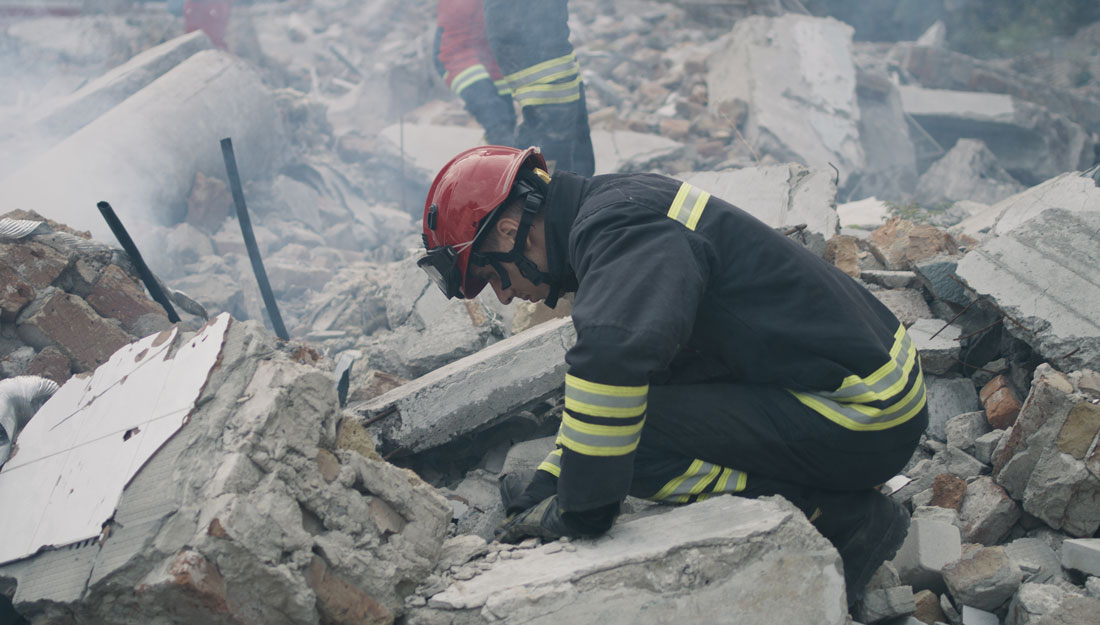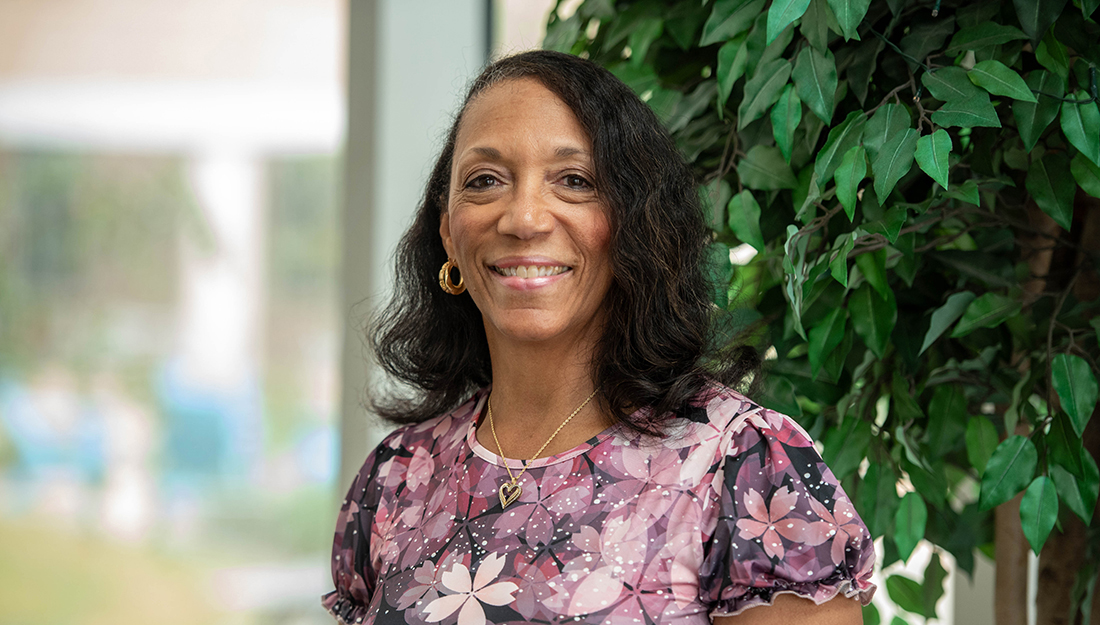- Mary Leigh Meyer
- Medicine, Quarterly Theme, Show on VR homepage
Empowering from the bottom up
Medical student Megan Badejo strives to inspire young girls and teach them the importance of following their dreams

A portrait of Megan Badejo
What inspires you to be a woman in medicine?
The journey inspires me. When I realized I wanted to be a surgeon, I was presented with quite a few challenges. One of the biggest challenges was finding mentors in the field and people who could give me a better representation of what my life would look like if I pursued medicine. Initially, the medical profession felt like a place that was not for me because I did not see those role models. This lack of representation played a large role in my decision to consider other careers in the health care field, but I kept returning to my original goal of becoming a surgeon. Most of all, I wanted to cultivate that incredibly unique patient-physician relationship and be able to offer the definitive treatment for my patient’s care.
Fortunately, during my undergraduate career, I was part of an organization that supported first-generation students. This organization connected me with a female surgeon. At the time, my hometown—Dallas, Texas—had a number of female physicians, but few female surgeons. I am so thankful to have met her because, through her, I gained a lot of exposure to the discipline in the clinic and operating room as well as with research and academic medicine. She also taught me how being a woman provides a unique and critical perspective on the patient experience and how our particular considerations support patient outcomes.
Just as importantly, I witnessed how she excelled in her craft alongside her male counterparts and, in the same breath, managed to take time to nurture an amazing family. I think this fear about work-life balance is a limiting concept for many women and young girls considering pursuing surgery. For me, it was encouraging to see it done so well. Although my mentor was not a minority, she absolutely supported me and the idea that the world needs more diverse surgeons.
Thanks to these experiences, I overcame my initial fears and I am now moving quickly toward my goal and chasing after my dream.
How did you decide to pursue medicine?
My family is originally from Nigeria, but I was born in Dallas. My mom immigrated to Texas before I was born, so I am a first-generation American. In the beginning, a lot of what drove me to medicine had to do with how many family members we lost in Nigeria. It seemed like someone in my family was constantly dying or having a major health crisis, whether it was an aunt, uncle or cousin. When I was younger, I knew something was wrong, but I did not know what. It was this concept of death and illness that drove me to pursue medicine at first.
However, as I aged, I started to learn more about the different barriers to quality health care. For my family, we did not have a lot of money or resources, so our barrier was affording care. That being said, I found that there were many ways in which people found themselves without opportunity and means to attain adequate care. In addition to not being able to afford care, I saw that others did not have a provider within their city and could not attain the transportation needed to find one. The other truth and layer to the greater health care inadequacy is that some people are afraid of health care providers, which has its roots buried in many cultural and social issues.
These circumstances present a wide range of problems that are destined to create and further disparity in the people who experience them. I chose medicine because I want to be a part of the solution to this disregarded reality. I want to be a provider people can trust and access. A lot of people in my culture are afraid and have reservations. Similarly, a lot of other minorities are fearful of what a physician could do to them or tell them. I wondered how different that experience might be if these patients could receive the care they needed from clinicians who have a better understanding of what their life and concerns are like beyond the walls of the clinic. So, as cliché as it is, I thought, “Why not be that difference?”
What was your biggest hurdle?
We have plenty of hurdles, and I am sure I have only just begun when it comes to them. So far, one of the most significant hurdles for me was challenging other people’s expectations. Sometimes, people discourage you from following a certain path because they believe you have a better chance at finding success elsewhere. One place I recall experiencing this discouragement was as a student athlete in college. Everyone is excited when you say you want to go into medicine until they see how much work and time that demands. When they understood the reality of my desires, many people continuously encouraged me, but I also had several people discourage me. Those discouragements weighed on me more than the encouragements.
The other significant hurdle that I faced is one I experience internally. A lot seems to matter when it comes to the things I do or say, which stems from being a black woman in medicine. The optics of any situation have to be considered and assessed, twice over. The decisions I make are not just my own, they implicate how others may perceive the next minority or female in medicine. To be completely honest, this is a hurdle that is still a work in progress for me, but I hope this hurdle becomes a strength for me. If what I say and do actually matters, I hope I can impact others positively and redirect the attention to increasing women and minorities in all medical professions. My hope is one day people like me are not the exception but the expectation in a white coat.
How do you hope to help future women in medicine?
More than anything, I want to encourage people, especially women and minorities, to pursue medicine. I want to provide a perspective, share my story, extend a hand and cheerlead for any woman that was told or felt like she could not be a physician. My journey taught me the importance of having mentors and role models who looked like me and who could support me in the medical field. Growing up, my life could have gone in many directions. However, I ended up on this path, because I had the right support system and opportunities. As a result, I try to pay the kindness back.
The fact is I know many young girls are approaching crossroads in their lives, much like the crossroads I faced. However, some of these girls do not have the luxury of a mentorship like I did. My opportunity to be a difference for someone lies here. I want girls facing that crossroads to know they are worthy of pursuing medicine, regardless of their education or socioeconomic status. Whether they are in undergraduate or elementary school, I hope to instill overall educational empowerment into these women and girls. I want students of all ages to believe they can pursue any field they want.
You mention you want to instill educational empowerment. What does that look like?
Well, as much as I dislike public speaking, I try to get in front of and connect with as many students and kids as I can. I started off by holding talks and panels at my high school to encourage students to finish and consider medicine as a possibility. In undergraduate, I also got passionate about promoting excitement for education, because education is the first step in the direction of any dream. To help, I put together reading programs for elementary schools in Dallas ISD.
Similarly, mentoring starting from my undergraduate years has given me opportunities over the last four years to support and promote young girls in surgery as well as in the STEM fields. With that, I have been able to encourage the girls who still question their qualifications as well as the parents who need living proof of this opportunity for their daughters.
As president of my medical school class, I set a goal to get our students into schools and the community. Because the Texas A&M College of Medicine is a multi-campus institution, my classmates and I have the opportunity to provide impact, regardless where we are. Each of the campus leaders generated incredible ideas to achieve our outreach goal and instill the message of encouragement to their community.
At one elementary school, we founded the Dare to Dream Program, a science-specific education empowerment program for a third-grade class in Bryan, Texas. The program is designed specifically to follow the state’s standardized testing goals as well as their classroom curriculum. We picked the third-grade level because this grade is when most schools first introduce science concepts into the curriculum. Our class’s community service chair at the time, Andrea Scott, and I got an amazing team together to write stories and build curriculum geared toward third-grade STEM topics. We are piloting the program in one school this year, and we hope to expand the program moving forward. It is one thing for me to try to make impact on my own, but it is something else entirely to provide avenues for my peers to extend our reach. The goal is to empower from the bottom up, and I think we really are finding success.
What is your advice to future women in medicine?
Medical school is hard. Being a woman in medicine is hard. Being a minority in medicine is hard. That being said, I think it is a struggle that is absolutely worth fighting. Be confident, endure and make a difference. You are worthy of pursuing your goals, so do it.
Media contact: media@tamu.edu


